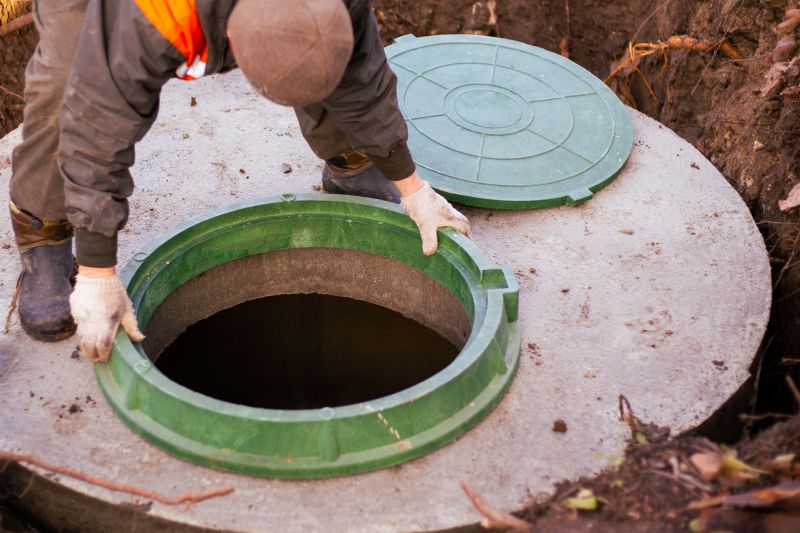Top Products For Septic Installations To Ensure Reliable Performance
Explore essential tools and components that help you achieve efficient and long-lasting septic system setups.
 Septic installation projects require a comprehensive selection of products designed to facilitate efficient waste management and long-term system performance. From initial setup components to maintenance supplies, the right products can help ensure proper functioning of septic systems. When choosing these products, it is essential to consider factors such as durability, compatibility with existing infrastructure, ease of installation, and compliance with local regulations. Having a well-curated set of tools and materials can make the installation process smoother and help prevent future issues.
Septic installation projects require a comprehensive selection of products designed to facilitate efficient waste management and long-term system performance. From initial setup components to maintenance supplies, the right products can help ensure proper functioning of septic systems. When choosing these products, it is essential to consider factors such as durability, compatibility with existing infrastructure, ease of installation, and compliance with local regulations. Having a well-curated set of tools and materials can make the installation process smoother and help prevent future issues.
Top Overall Option
Septic System Installation Kit
A comprehensive septic system installation kit typically includes essential components such as tanks, piping, fittings, and installation tools. These kits are designed to provide all necessary parts for a complete setup, simplifying the process for DIY enthusiasts or professional installers. They often come with detailed instructions and quality materials to help ensure proper installation and system longevity.
Types of Products For Septic Installations
Septic Tanks
Preformed tanks made from durable materials like polyethylene or concrete, designed to hold and treat waste efficiently.
Distribution Boxes
Components that evenly distribute effluent from the septic tank to drain fields, ensuring balanced flow.
Septic Piping
Specialized pipes made for underground installation, resistant to corrosion and designed for waste transport.
Effluent Filters
Filters installed in the outlet of septic tanks to prevent solids from entering drain fields.
Inspection Ports
Access points that allow for easy inspection and maintenance of septic tanks.
Septic Additives
Chemical or biological agents used to aid in waste breakdown and system maintenance.
Drain Field Gravel
Gravel used in drain fields to facilitate proper drainage and prevent soil clogging.
Septic Tank Baffles
Internal components that prevent solids from flowing into the outlet and improve settling.
Pump Systems
Pumps used in systems where gravity flow is insufficient, aiding in waste movement.
Maintenance Chemicals
Solutions designed to keep septic components clean and functioning properly.
Septic Tank Risers
Extensions that elevate access points for easier inspection and pumping.
Drain Field Distribution Pipes
Pipes that distribute effluent evenly across the drain field area.
Septic System Monitors
Devices that track system performance and alert owners to potential issues.
Backflow Preventers
Valves that prevent contaminated water from flowing back into the septic system.
Septic System Cleanout Plugs
Access points for cleaning and maintenance of pipes and tanks.
Popular Choices
Various fittings and components that support the installation and maintenance of septic tanks.
Materials used to optimize drainage in septic drain fields and prevent clogging.
Products that help filter solids from wastewater before it reaches drain fields.
Critical for routine inspections and maintenance activities of septic tanks.
Devices used to move waste in systems with challenging terrain or gravity limitations.
Tools that enable remote or manual monitoring of system health and performance.
Pipes and fittings designed to evenly distribute effluent across the drain field.
Elevated access points for easier inspection and servicing of tanks.
Products that promote the natural breakdown of waste within septic systems.
Valves that safeguard against reverse flow and potential contamination.
Chemicals used to maintain system balance and prevent buildup.
Tools and solutions for routine cleaning and upkeep of septic components.
Long-lasting pipes designed for underground installation and waste transport.
Various fittings that ensure secure connections between septic components.
Specialized cameras for detailed inspection of tanks and pipes.
Materials such as fabric wraps or filters that improve drain field efficiency.
Septic systems typically involve several key components, including tanks, distribution boxes, piping, and treatment additives. Proper installation and maintenance of these elements are crucial to avoid backups, leaks, or system failures. Selecting high-quality, reliable products tailored to the specific needs of the property can extend the lifespan of the septic system and reduce maintenance costs over time.
Investing in the right accessories and supplementary products, such as inspection ports, filtration systems, and cleaning supplies, can further enhance system performance. Regular inspection and timely replacement of worn-out parts are vital for ongoing operation. It is advisable to consult with professionals or adhere to manufacturer guidelines to ensure compatibility and optimal functioning of all components involved in septic installation projects.
Key Buying Considerations
- Compatibility with existing septic system components and layout.
- Material durability and resistance to corrosion or degradation over time.
- Ease of installation, especially for DIY projects or in tight spaces.
- Compliance with local codes and regulations governing septic systems.
- Size and capacity appropriate for the expected waste volume and household size.
- Availability of replacement parts and ease of future maintenance.
- Quality and reputation of the manufacturer or supplier.
- Features such as inspection ports or risers that facilitate maintenance.
- Appropriate filtration or treatment options to prevent system clogging.
- Cost-effectiveness considering both initial investment and long-term operation.
- Environmental conditions and soil type in the installation area.
- Compatibility with additional system components like pumps or alarms.
- Warranty and customer support offered by the product manufacturer.
- Ease of access for inspection, cleaning, and repairs.
- Potential for expansion or upgrades in the future.
This page contains affiliate links and recommendations. We may earn a commission from qualifying purchases at no additional cost to you.
